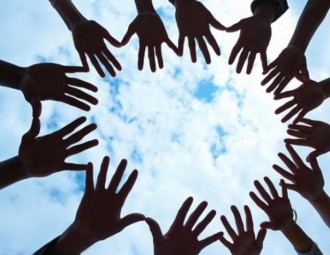Leanid Kalitsenia: We should overcome myths and archaic ideas about citizenship

What prevents Belarusans from building harmonious social relations and feel happy with life in the society, and how can it be fought?
A sincere talk with Leanid Kalitsenia, the head of the Center for Social Innovation and a coordinator of the “Citizenship.BY” campaign.
- The campaign “Citizenship.BY” with its own program of “reboot” of civic education in Belarus has been active for three years now. In your opinion, what is its main conclusion for today?
- It would be not very accurate to say that we have some kind of our own program for reloading the Belarusan society or civic education in Belarus. The term “reboot” rather matches our slogan. The “Citizenship.BY” campaign started working within the frames of the Association of Life-Long Learning and Enlightenment and works according to conceptual developments elaborated together with the leading experts in the sphere of civic education and representatives of civic organizations of members of the Associations. We also take into account modern programs in the sphere of civic education: Charter of active citizenship, concept of civic education in Belarus, etc. Our campaign is a tool for implementation of these concept developments.
There is no doubt that over the three years of work we have certain results, but it is too early to make final conclusions so far. All the more that civic education, likewise democracy, is a permanent process, not some final result. Thus, however it might sound, our main result is that we have the campaign that is trying to answer the actual challenges of modern life, actively participate is civil life through social networks (Facebook and VKontakte), and aim the civic life in this direction according to our concept. This process of realizing segments of civic education in society is our most important result.

- Does everything look the same in practice as it was meant? What do we manage to “reboot” in the Belarusan society, and what do we not, and why?
- We are not considering theory and practice separately. Theory enables us to plan practice better; however, we change theoretic images even during the implementation.
As to the “reboot”, I’d say that it isn’t happening that fast as we would like to; however, we are happy with the reached results. Society is a very complicated organism that lives according to its own laws and its own trends. In order to “reboot” something in the society, one should start from him or her own. A lot of people manage to do it: by this I mean numerous partners, experts, and participants, who joined our activity… For example, I am very glad to have cooperation with Aleh Hamenka, musician and producer, who helped us to organize the first actual civic art “Citisenship.BY”. And this year we helped the project “Belarusan tales for iPhone and iPad” that Aleh Hamenka made together with Andrei Zalatar. Such facts of civic cooperation are the positive result that we are working for: when no one makes anyone, but people agree instead and do common work together.
As to those for whom “reboot” isn’t happening yet, these are those who cannot overcome their myths and archaic ideas about citizenship, modern civic community, and its needs. We would very much like the society to change this situation. However, we clearly see its scales, so nothing is happening that quickly…
- How lively and viable is civic community in today’s Belarus? Can and should be the work with it organized?
Civic community is the phenomenon that can never be described in its present state that is changing everyday. Ukrainian Maidans can describe that: they burst out unexpectedly despite all the expert research.
We need to work for the civic community and invest in its development; because unless we do that, it will become impossible to live in the society. We need to note that civic community doesn’t necessarily provide for some political activity. First of all, citizens should be able to agree easily and make life around them better. Harmonious social relations and social comfort is nonetheless important than the level of salary. That’s why social environment can and should be changed. The famous Scandinavian well-being exists, first of all, thanks to harmonious relations within the society, not economic achievements. Citizens feel happy because they feel great satisfaction from living in their country and in their society.
- What tasks does the “Citizenship.BY” campaign as the guide of civic education set in connection with today’s situation? What format are you planning to work in in the future and what for?
- This spring we organized a pilot education course “12 steps to modern citizenship” in Minsk that gathered people from different regions of the country. We would like to repeat this course in autumn, but at a higher level. Among other plans for the autumn is to hold a song or poem competition – we are still considering genres, but it will surely be some creative format. Earlier we have already had a positive experience with the lyrics, scenario, and photo competitions; so we want to translate the concept of civic education in such formats later on. The format of school lectures and even seminars seem important, but anachronistic. A modern person is educated first of all through media sphere, not through school classes and seminar halls.
Thus, we will be orienting towards modernist and perspective forms of translating civic education later on.
-
03.01
-
07.10
-
22.09
-
17.08
-
12.08
-
30.09



























